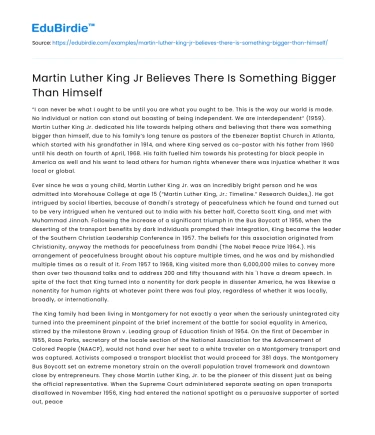Introduction
Martin Luther King Jr., a towering figure in American history, is often celebrated for his tireless work in the civil rights movement. However, his influence extends beyond his individual contributions, as he consistently emphasized a commitment to a higher cause. King's belief in a transcendent purpose was not confined to the pursuit of equality alone; it was deeply rooted in the conviction that moral and ethical imperatives transcend personal ambitions. This essay explores Martin Luther King Jr.'s belief in a cause greater than himself, examining how his vision for justice and equality was intertwined with his religious convictions and his understanding of the interconnectedness of humanity. Through his speeches, writings, and actions, King demonstrated a profound dedication to principles that surpassed personal gain, and he inspired others to join in this collective struggle for a better world. By analyzing King's philosophical and theological underpinnings, we can better appreciate the enduring impact of his legacy and the relevance of his message in contemporary society.
King's Religious Convictions and Moral Philosophy
Central to Martin Luther King Jr.'s belief in a greater purpose was his deep-seated religious conviction. As a Baptist minister, King's theological foundation was pivotal in shaping his worldview. He was profoundly influenced by the Christian doctrine of the "Beloved Community," a vision of a society based on justice, equal opportunity, and love of one's fellow human beings. This concept, articulated through his speeches and writings, was not merely an abstract ideal but an actionable blueprint for societal transformation. According to King, "Injustice anywhere is a threat to justice everywhere," a quote from his seminal "Letter from Birmingham Jail" which underscores his belief in the moral responsibility to combat injustice collectively rather than individually (King, 1963).
Save your time!
We can take care of your essay
- Proper editing and formatting
- Free revision, title page, and bibliography
- Flexible prices and money-back guarantee
King's commitment to nonviolence further illustrates his adherence to moral and ethical principles that transcend personal interests. Influenced by Mahatma Gandhi's philosophy of nonviolent resistance, King applied these principles to the American civil rights movement. He believed that nonviolence was not just a tactic but a moral imperative, a reflection of a higher ethical standard. In his speech "The Power of Nonviolence," King asserted that nonviolence "seeks to defeat injustice, not people," highlighting his focus on systemic change rather than personal vendettas (King, 1957). This philosophy required a profound level of selflessness, as it often meant enduring personal suffering for the greater good.
The Interconnectedness of Humanity and Collective Action
Martin Luther King Jr.'s vision extended beyond the borders of race and nation, encapsulating a belief in the interconnectedness of all humanity. He argued that human beings are caught "in an inescapable network of mutuality," suggesting that the struggles of one group are inherently linked to the struggles of all (King, 1963). This perspective was revolutionary in its call for a global coalition against injustice and its recognition of shared human dignity.
King's advocacy for economic justice further exemplifies his commitment to collective action. In his speech "Where Do We Go From Here?" King highlighted the importance of addressing poverty and economic inequality as part of the broader civil rights struggle. He emphasized that true freedom cannot exist without economic security, arguing for a comprehensive approach to justice that includes economic reform (King, 1967). This holistic vision required the participation of diverse groups, transcending racial and cultural divides to create a unified front against systemic oppression.
Counter-Arguments and Reaffirmation of King's Vision
While some critics argue that King's focus on nonviolence and his religiously rooted philosophy limited the scope of his activism, such criticisms overlook the transformative power of his approach. The peaceful protests and civil disobedience led by King and others were instrumental in achieving significant legislative changes, such as the Civil Rights Act of 1964 and the Voting Rights Act of 1965. These achievements underscore the effectiveness of King's methods and the moral authority that his vision commanded.
Moreover, King's emphasis on collective action and interconnectedness remains pertinent in addressing contemporary issues. In an increasingly globalized world, challenges such as climate change, economic inequality, and racial injustice require coordinated efforts that transcend individual interests. King's belief in a larger purpose serves as a guiding principle for modern movements seeking to address systemic issues through unity and solidarity.
Conclusion
Martin Luther King Jr.'s legacy is a testament to his unwavering belief in a cause greater than himself. His religious convictions and moral philosophy provided a framework for understanding justice and equality as universal imperatives, transcending personal ambition. By advocating for nonviolence and collective action, King demonstrated the power of a unified struggle in effecting meaningful change. Although criticisms of his approach exist, the enduring impact of his work affirms the relevance of his vision in contemporary society. As we continue to confront global challenges, King's message of interconnectedness and moral responsibility remains a beacon of hope and a call to action for future generations.






 Stuck on your essay?
Stuck on your essay?

